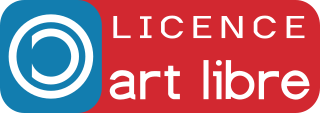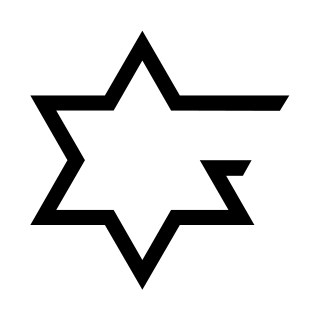The Open Publication License (OPL) was published by the Open Content Project in 1999 as a public copyright license for documents. It superseded the Open Content License, which was published by the Open Content Project in 1998. Starting around 2002-2003, it began to be superseded, in turn, by the Creative Commons licenses.

A Creative Commons (CC) license is one of several public copyright licenses that enable the free distribution of an otherwise copyrighted "work". A CC license is used when an author wants to give other people the right to share, use, and build upon a work that the author has created. CC provides an author flexibility and protects the people who use or redistribute an author's work from concerns of copyright infringement as long as they abide by the conditions that are specified in the license by which the author distributes the work.

The Free Art License (FAL) is a copyleft license that grants the right to freely copy, distribute, and transform creative works except for computer hardware and software, including for commercial use.
This comparison only covers software licenses which have a linked Wikipedia article for details and which are approved by at least one of the following expert groups: the Free Software Foundation, the Open Source Initiative, the Debian Project and the Fedora Project. For a list of licenses not specifically intended for software, see List of free-content licences.

Public-domain-equivalent license are licenses that grant public-domain-like rights and/or act as waivers. They are used to make copyrighted works usable by anyone without conditions, while avoiding the complexities of attribution or license compatibility that occur with other licenses.

Open-source Judaism is a name given to initiatives within the Jewish community employing open content and open-source licensing strategies for collaboratively creating and sharing works about or inspired by Judaism for faster, instantaneous communication. Open-source efforts in Judaism utilize licensing strategies by which contemporary products of Jewish culture under copyright may be adopted, adapted, and redistributed with credit and attribution accorded to the creators of these works. Often collaborative, these efforts are comparable to those of other open-source religious initiatives inspired by the free culture movement to openly share and broadly disseminate seminal texts and techniques under the aegis of copyright law. Combined, these initiatives describe an open-source movement in Judaism that values correct attribution of sources, creative sharing in an intellectual commons, adaptable future-proof technologies, open technological standards, open access to primary and secondary sources and their translations, and personal autonomy in the study and craft of works of Torah.
License compatibility is a legal framework that allows for pieces of software with different software licenses to be distributed together. The need for such a framework arises because the different licenses can contain contradictory requirements, rendering it impossible to legally combine source code from separately-licensed software in order to create and publish a new program. Proprietary licenses are generally program-specific and incompatible; authors must negotiate to combine code. Copyleft licenses are commonly deliberately incompatible with proprietary licenses, in order to prevent copyleft software from being re-licensed under a proprietary license, turning it into proprietary software. Many copyleft licenses explicitly allow relicensing under some other copyleft licenses. Permissive licenses are compatible with everything, including proprietary licenses; there is thus no guarantee that all derived works will remain under a permissive license.

Free content, libre content, libre information, or free information is any kind of functional work, work of art, or other creative content that meets the definition of a free cultural work, meaning "works or expressions which can be freely studied, applied, copied and/or modified, by anyone, for any purpose."

A free-software license is a notice that grants the recipient of a piece of software extensive rights to modify and redistribute that software. These actions are usually prohibited by copyright law, but the rights-holder of a piece of software can remove these restrictions by accompanying the software with a software license which grants the recipient these rights. Software using such a license is free software as conferred by the copyright holder. Free-software licenses are applied to software in source code and also binary object-code form, as the copyright law recognizes both forms.

Copyleft is the legal technique of granting certain freedoms over copies of copyrighted works with the requirement that the same rights be preserved in derivative works. In this sense, freedoms refers to the use of the work for any purpose, and the ability to modify, copy, share, and redistribute the work, with or without a fee. Licenses which implement copyleft can be used to maintain copyright conditions for works ranging from computer software, to documents, art, scientific discoveries and even certain patents.

The GNU General Public License is a series of widely used free software licenses or copyleft that guarantee end users the four freedoms to run, study, share, and modify the software. The license was the first copyleft for general use and was originally written by Richard Stallman, the founder of the Free Software Foundation (FSF), for the GNU Project. The license grants the recipients of a computer program the rights of the Free Software Definition. These GPL series are all copyleft licenses, which means that any derivative work must be distributed under the same or equivalent license terms. It is more restrictive than the Lesser General Public License and even further distinct from the more widely used permissive software licenses BSD, MIT, and Apache.

The GNU Free Documentation License is a copyleft license for free documentation, designed by the Free Software Foundation (FSF) for the GNU Project. It is similar to the GNU General Public License, giving readers the rights to copy, redistribute, and modify a work and requires all copies and derivatives to be available under the same license. Copies may also be sold commercially, but, if produced in larger quantities, the original document or source code must be made available to the work's recipient.
Creative Commons is maintaining a content directory wiki of organizations and projects using Creative Commons licenses. On its website CC also provides case studies of projects using CC licenses across the world. CC licensed content can also be accessed through a number of content directories and search engines.
A Rights Expression Language or REL is a machine-processable language used to express intellectual property rights and other terms and conditions for use over content. RELs can be used as standalone expressions or within a DRM system.

The Definition of Free Cultural Works evaluates and recommends compatible free content licenses.
Open Game Art is a media repository intended for use with free and open source software video game projects, offering open content assets.
A free license or open license is a license which allows others to reuse another creator’s work as they wish. Without a special license, these uses are normally prohibited by copyright, patent or commercial license. Most free licenses are worldwide, royalty-free, non-exclusive, and perpetual. Free licenses are often the basis of crowdsourcing and crowdfunding projects.
A public license or public copyright licenses is a license by which a copyright holder as licensor can grant additional copyright permissions to any and all persons in the general public as licensees. By applying a public license to a work, provided that the licensees obey the terms and conditions of the license, copyright holders give permission for others to copy or change their work in ways that would otherwise infringe copyright law.
Software relicensing is applied in open-source software development when software licenses of software modules are incompatible and are required to be compatible for a greater combined work. Licenses applied to software as copyrightable works, in source code as binary form, can contain contradictory clauses. These requirements can make it impossible to combine source code or content of several software works to create a new combined one.